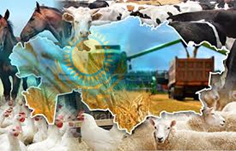5В080200-Animal Technology Production
The model of a graduate
Bachelor's degree program «Technology of livestock products production»
 The technologist of production of animal products is the versatile expert possessing knowledge of administration and management of production processes in branch of animal husbandry and primary processing of animal products, on use of modern methods of scientific researches in the field of feeding, cultivation, selection of farm animals and a bird. The technologist of production of animal products is the versatile expert possessing knowledge of administration and management of production processes in branch of animal husbandry and primary processing of animal products, on use of modern methods of scientific researches in the field of feeding, cultivation, selection of farm animals and a bird. |
| The purpose of the educational program |
|
Training of highly qualified specialists using modern environmentally safe technologies of production and primary processing of animal products and raw materials, developing modern technologies of feeding, keeping and breeding of animals in order to increase productivity and profitability of agricultural enterprises |
| Awarded degree |
| Bachelor of Agriculture in the educational program "6B08201 Technology of production of livestock products" |
| List of specialist positions |
| Head of Department of animal husbandry, assessment specialist, livestock production, head of laboratory for feed quality, inspector of breeding work, the technologist-Manager of the organization of production of livestock products the main livestock, livestock breeder, geneticist, hippology, livestock, animal psychology degree in fishery technology of milk and milk products, technology, food, ichthyologist, herders, hunters, birder, beekeeper, farmer, technician asemanator, plem.clerk, researcher, College teacher, Lyceum |
| Objects of professional activity |
| state institutions of the Ministry of agriculture, research institutes and centers, vocational schools, universities, farms, complexes, poultry farms, racecourses, breeding plants zoos, reserves, livestock enterprises, production enterprises and laboratories of the processing industry |
| Functions of professional activity |
|
- organization and management of livestock production and raw materials; - maintenance of production and statistical records of animals, birds in the database; - carrying out research and development of design and estimate documentation of livestock facilities; - breeding and biotechnology in animal husbandry; - organization of production and procurement of feed, chemical analysis of the composition and quality of feed; - primary processing of animal products and raw materials; - marketing and marketing of livestock products; - implementation of functions on control of quality of the made production - teaching in secondary vocational schools on the profile of the specialty. |
| Personal characteristics |
|
1.General civil qualities: patriotism, expressed in love for the Motherland, citizenship, determined by an active life position, civic consciousness, law-abiding, understanding of their civil rights, freedoms and duties. 2.Spiritual and moral qualities: humanity, honesty, conscientiousness, tolerance to other beliefs, views on the world and customs, decency, mercy. 3.Intellectual qualities: erudition, critical and emotional thinking, knowledge of English, information and communication technologies, the ability to learn throughout life. 5.Business qualities: diligence, responsibility, flexibility, adaptability, ability to work in a team, ability to make non-standard decisions in emergency situations. 6.Organizational-strong-willed qualities: purposefulness, self-discipline, self-criticism, self-discipline, communication skills, General culture, will, ability to achieve the intended purpose. 7. Special qualities: observation, patience, accuracy and concentration |
| Results of Bachelor of Agriculture (Dublin Descriptors) |
|
At the end of the educational program, graduates can: 1) carry out production activities at processing and livestock enterprises; 2) select and use different methods of evaluation and quality control of raw materials, finished animal products; 3) to choose and observe the regimes of keeping animals, to make feeding rations; 4) to carry out measures to improve the reproduction of the herd, increase the productivity and yield of young farm animals and birds, breeding and biotechnology. |

